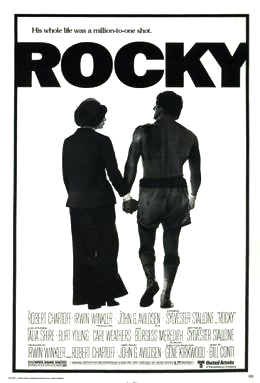 Most men in my generation (Gen X) grew up with the Rocky films. But only the first one remains an archetypal boxing film, and a movie that transcends the boxing film genre. That first film, much like Raging Bull and From Here to Eternity, is a great film. Like Raging Bull, Rocky is more a film about relationships and their power in our lives -- but they also seek to define the masculine role in the world.
Most men in my generation (Gen X) grew up with the Rocky films. But only the first one remains an archetypal boxing film, and a movie that transcends the boxing film genre. That first film, much like Raging Bull and From Here to Eternity, is a great film. Like Raging Bull, Rocky is more a film about relationships and their power in our lives -- but they also seek to define the masculine role in the world.All three films, each in its own way, deals with male violence and its role in culture. In all three, aggression is only sanctioned and respected in its ritualized forms:
Fighting therefore must be contextualized in the spectacle of formalized boxing or war in order for it to be a redeemable masculine characteristic. Brute force or violent tactics without justification are punished or frowned upon.Rocky's role as an "enforcer" is demeaned. He should have been a great boxer. The film documents his attempt to recontextualize violence as an art, as a culturally-sanctioned ritual, and at the same time to develop emotionally as a human being in his relationship with Adrian. As such, it reflects the shifting cultural landscape of its time, and reflects male roles that are still in transition today.
Transcending Masculinity is an online paper that examines all these issues in Rocky. The paper is insightful and relevant to any man's efforts to express warrior energy in appropriate ways.
Here is the abstract to the paper.
Notions of masculinity have been discussed in film scholarship for decades, with the genre of action films, particularly that of the boxing film, providing a most fertile ground for discourse. While Rocky (1976) did not inaugurate the genre, it remains one of the seminal films of not only the boxing genre, but of all American films, providing an archetype of masculinity that spawned a franchise. Many of these films repeat a theme of triumph against all odds that relies on a negotiation and assertion of masculinity in its most physical (and often violent) forms. Jurgen Reeder (1995) asserts that “these films seem to be a kind of ritual where a seemingly identical dramatic structure is reiterated many times over…such ritual repetition of dramatic themes express[es] an epoch’s need to explore an experience that as yet has not been adequately formulated and thematized” (131). The ‘experience’ that has yet to be adequately formulated in Rocky is a construction of masculinity that must adapt to, and reflect, the changing cultural climate of working- and middle-class values in light of civil rights and gender equality. In his struggle to achieve champion status, Rocky Balboa navigates a new cultural terrain marked by a disruption of traditional gender roles. While the hard-body/ action genre of films has presented an arguably homogenous class of masculine iconography, Rocky can be deconstructed today in light of an historical re-reading to demonstrate a nuanced representation of masculinity simultaneously embodied in the character’s physical strength and emotional development, both of which are achieved through his interpersonal relationships. Rocky Balboa’s masculinity is marked by a personal catharsis of emotional self-actualization that transcends his raw physicality and role as an underdog boxer. As any athlete will tell you, physical strength is enhanced by a mental and emotional fortitude, which develops in Rocky primarily though the titular character’s interpersonal relationships. Rocky’s development both physically and emotionally is enhanced through his relationships with principle love interest, Adrian (Talia Shire), and boxing rival Apollo Creed (Carl Weathers) as well as the other men, most notably the father-figure trainer, Mickey (Bergess Meredith), and Adrian’s brother Paulie (Burt Young). In contrast to views expressed in other studies of the film, Rocky presents a nuanced, if somewhat sentimental, archetype of a man who must negotiate his masculinity through complex emotional relationships with others, while simultaneously developing his physical strength. It is these relationships that frame the central plot of Rocky’s physical training and ultimate match in the boxing ring, which, unlike the interpersonal relationships, ends in ambivalent defeat.
SUGGESTED CITATION:
Heather Collette-VanDeraa, "Transcending Masculinity" (May 1, 2008). UCLA Center for the Study of Women. CSW Update Newsletter. Paper May08_Collette-VanDeraa.
http://repositories.cdlib.org/csw/newsletter/May08_Collette-VanDeraa
Tags:
No comments:
Post a Comment